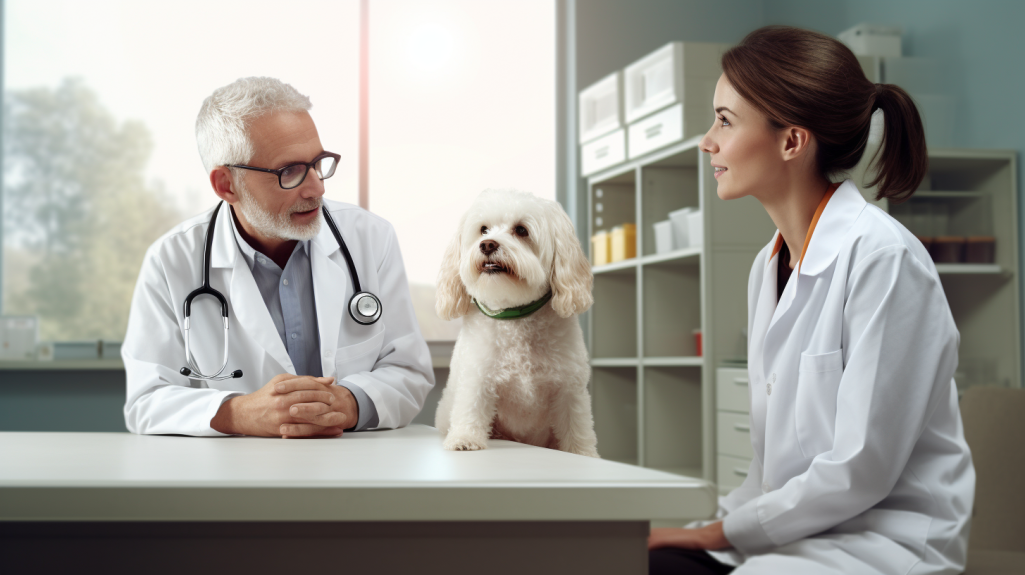If you are a dog owner, you’ve likely heard of probiotics and their potential benefits for your furry friend. Probiotics are live microorganisms that can improve gut health and support the immune system. They’re becoming more popular as a natural way to alleviate digestive issues and improve overall well-being in dogs.
However, you might wonder how long it takes for probiotics to work in dogs and what factors can influence their effectiveness. In this guide, we’ll explore the benefits of probiotics for dogs, how they work, and the typical timeframe for seeing results. We’ll also discuss how to choose the right probiotics for your dog and other ways to support their gut health naturally.
Key Takeaways:
- Probiotics can improve digestive health, enhance nutrient absorption, and boost the immune system in dogs.
- It takes a few days to a few weeks to see results from probiotics in dogs, depending on various factors like their health condition, probiotic strain, and dosage.
- Introducing probiotics gradually and monitoring your dog’s response is crucial for achieving optimal results.
- Consulting with a veterinarian and conducting additional research can help you make an informed decision about probiotics for your dog.
The Benefits of Probiotics for Dogs
If you’re considering probiotics for your dog, understanding their benefits can help you make an informed decision. Probiotics can improve your dog’s digestive health, enhance nutrient absorption, and support a healthy balance of gut flora, the beneficial bacteria that live in your dog’s gut. Additionally, probiotics can boost your dog’s immune system, helping it fight off harmful pathogens.
Probiotics can:
- Promote digestive health
- Improve gut flora balance
- Enhance nutrient absorption
- Boost the immune system
Improving your dog’s gut health is essential to maintaining their overall well-being. Providing the right balance of beneficial bacteria can be especially beneficial for dogs with chronic digestive issues, such as inflammatory bowel disease, or those who have undergone antibiotic therapy that may have disrupted the gut flora balance.
Additionally, probiotics have been shown to be effective in promoting a healthy coat and skin for dogs.

“Probiotics have the potential to provide significant benefits for your furry friend, including improved digestive health and a strengthened immune system. Consider incorporating probiotics into your dog’s routine for overall wellness.”
Understanding How Probiotics Work in Dogs
Probiotics work in dogs by introducing beneficial bacteria to their gut, helping to maintain a healthy balance and supporting overall well-being. The digestive tract of dogs contains both good and bad bacteria, and a healthy balance between the two is necessary for optimal gut health.
When probiotics are ingested, they work by replenishing or adding to the existing population of beneficial bacteria in the gut. This helps to crowd out harmful bacteria, restore balance, and improve the overall health of the gut. Probiotics can also increase the production of short-chain fatty acids, which help to nourish the cells lining the gut and improve digestion.
In addition to supporting digestive health, probiotics have been shown to have a positive impact on the immune system. Research has suggested that the presence of certain strains of beneficial bacteria can enhance immune function, help fight infections, and reduce inflammation in the body.

It’s important to note that not all probiotics are created equal and each strain can have different effects. Therefore, it’s essential to choose a probiotic supplement that is specifically formulated for canine health and contains strains that have been shown to be effective in dogs.
Factors Influencing Probiotic Effectiveness in Dogs
When it comes to probiotics for dogs, it’s important to keep in mind that several factors may influence their effectiveness. Here are some of the key ones to consider:
| Factors | Description |
|---|---|
| Individual Health Condition | The underlying health condition of the dog may determine the speed and depth of probiotic response. For instance, dogs with severe digestive issues may take longer to see results than those with mild conditions. |
| Probiotic Strain | Not all probiotic strains are the same, and some may work better for certain conditions than others. Additionally, some dogs may respond to specific strains better than others. |
| Probiotic Dosage | The dosage of probiotics may vary depending on the dog’s size, health condition, and the specific product. It’s essential to follow the manufacturer’s guidelines or your veterinarian’s recommendations to ensure optimal results. |
It’s also essential to have realistic expectations regarding how long probiotics for dogs may take to work. While some dogs may start to see improvement within a few days, others may take several weeks to respond. Additionally, individual responses may vary, so it’s crucial to monitor your dog’s reaction to probiotics regularly.

Typical Timeframe for Probiotic Effectiveness in Dogs
As a concerned pet owner, you may be wondering how long it takes for probiotics to work in your dog. While individual results may vary, many dogs can experience the benefits of probiotics within just a few days to a few weeks.
However, it’s important to keep in mind that probiotics are not a quick-fix solution and may require ongoing use to maintain their effectiveness. Patience and consistency are key in seeing long-term improvements in your dog’s health.
Additionally, it’s important to monitor your dog’s response to probiotics and adjust dosages as needed. If you have concerns about the effectiveness of probiotics or your dog’s overall health, it’s best to consult with a veterinarian for personalized recommendations.

Note: The image above shows the typical timeline for probiotic effectiveness in dogs. However, it’s important to keep in mind that individual results may vary.
Introducing Probiotics to Your Dog
If you’re considering giving your dog probiotics to improve their overall health and well-being, it’s important to start the process gradually to prevent any digestion disturbances. Your veterinarian can help you determine the best way to introduce probiotics to your dog and recommend a suitable dosage based on their specific needs.
To begin, choose a high-quality probiotic supplement that is specifically designed for dogs and contains beneficial bacteria strains that support gut health. You can mix the probiotic supplement with your dog’s food or water, or administer it directly into their mouth with a dropper or syringe.
Start with a small dose and gradually increase it over a few days to a week to help your dog’s digestive system adjust and avoid any potential adverse effects. If your dog experiences any gastrointestinal disturbances or other negative reactions, reduce the dosage or stop using the supplement and consult with your veterinarian.
Remember to monitor your dog’s response to the probiotics and pay attention to any changes in their digestion, stool consistency, or general behavior. Regular communication with your veterinarian can help you determine the most effective probiotics regimen for your dog and ensure their optimal health.

Monitoring the Effects of Probiotics in Dogs
Once you have introduced probiotics to your dog, it is important to monitor their response to the supplements. This will help you gauge their effectiveness and ensure your dog is benefiting from them.
Observe changes in your dog’s digestion and stool consistency. You may notice a positive difference in their bowel movements, including firmer and more regular stools. Additionally, pay attention to any behavioral changes in your dog that may indicate improved overall health, such as increased energy or a brighter coat.
It is important to communicate regularly with your veterinarian to discuss any concerns you may have and to confirm if the probiotics are having the desired effect. They may also be able to suggest any necessary adjustments to your dog’s probiotic regimen.

Potential Side Effects of Probiotics in Dogs
While probiotics are generally safe for dogs, there is a slight risk of potential side effects, although these are rare. The most commonly reported side effects are mild gastrointestinal disturbances, such as bloating or gas.
If you notice any adverse reactions, stop giving your dog the probiotic supplement and contact your veterinarian for advice.
It’s important to note that probiotics should not be used as a substitute for proper medical treatment or medication prescribed by your veterinarian. Always follow the recommended dosage and consult with your veterinarian if you have any concerns.

Choosing the Right Probiotics for Your Dog
When selecting probiotics for your dog, it’s important to consider their specific needs and individual health condition. Below are some tips to help you choose the most suitable probiotic supplement for your furry friend:
- Consult with your veterinarian: A veterinarian can provide personalized recommendations based on your dog’s health history and current condition.
- Look for high-quality products: Ensure that the probiotic supplement is made by a reputable manufacturer and has undergone third-party testing for quality and purity.
- Check the strain: Different probiotic strains have different benefits, so choose a strain that addresses your dog’s specific health concerns. For example, Lactobacillus acidophilus is beneficial for improving digestion, while Bifidobacterium animalis promotes a healthy immune system.
- Choose the right formulation: Probiotics can be administered orally in the form of capsules, tablets, or powders, or topically through creams or sprays. Consider your dog’s preferences and ease of administration.
- Consider the dosage: Dosage recommendations can vary depending on the product and your dog’s size and health condition. Follow the instructions on the label or consult with your veterinarian for guidance.
By taking these factors into account, you can choose the best probiotic supplement for your dog to support their digestive health, immune system, and overall wellbeing.

Other Ways to Support Your Dog’s Gut Health
While probiotics are a beneficial addition to your dog’s diet, there are other ways you can support their gut health naturally.
Feed a balanced diet: A nutritious and well-balanced diet that includes high-quality protein, fiber, and essential vitamins and minerals is crucial for maintaining good gut health in dogs. Avoiding processed foods and excessive amounts of carbohydrates can also help.
Avoid unnecessary antibiotics: Overuse or misuse of antibiotics can disrupt the natural balance of bacteria in your dog’s gut. Whenever possible, try to limit the use of antibiotics to only when they are necessary and prescribed by your veterinarian.
Minimize stress: High levels of stress can negatively impact your dog’s gut health. Try to keep your dog’s environment as calm and stress-free as possible, and provide plenty of opportunities for exercise and playtime.
Provide regular exercise: Regular exercise helps to stimulate the digestive system and promote bowel movements, which can improve gut health in dogs.
By incorporating these tips into your dog’s routine, you can help to support their gut health and overall well-being.

Frequently Asked Questions about Probiotics for Dogs
As a responsible dog owner, you may have several questions regarding the use of probiotics for your furry friend. Here are some common FAQs:
- Are probiotics safe for dogs?
Yes, probiotics are generally safe for dogs to consume. However, it’s essential to choose a high-quality product and avoid giving your dog an excessive dosage, as this may result in digestive issues.
- Can probiotics interact with other medications?
While probiotics do not usually interact with other medications, it’s always advisable to consult with a veterinarian before giving your dog any new supplement.
- What are the best probiotics for dogs with digestive issues?
The ideal probiotic for your dog’s digestive issues will depend on their specific needs. Look for a product that contains strains like Lactobacillus acidophilus or Bifidobacterium animalis, which have been linked to improved gut health.
- Can probiotics improve my dog’s immune system?
Yes, probiotics have been shown to enhance the immune system in dogs by reducing inflammation and supporting healthy gut microflora.
- How long does it take for probiotics to work in dogs?
The timeframe for seeing results from probiotics in dogs can vary depending on various factors such as the specific probiotic strain used and the dog’s health condition. Generally, pet owners can expect to see noticeable improvements within a few days to a few weeks.
- Should I continue giving my dog probiotics after their health issue resolves?
It’s not necessary to continue giving probiotics to your dog once their health issue has resolved. However, you can continue using them as a regular supplement to maintain their gut health and overall well-being.

Case Studies: Real-Life Examples of Probiotic Success in Dogs
Many dog owners have seen positive results from using probiotics to support their pet’s health. Here are a few examples:
| Dog’s Name | Issue | Supplement Used | Result |
|---|---|---|---|
| Buddy | Chronic diarrhea | Probiotic Miracle | Stool consistency improved within days of starting the supplement |
| Max | Food allergies | PetUltimates Probiotics for Dogs | Less skin irritation and itching after several weeks of use |
| Bailey | Weak immune system | PetHonesty Probiotics for Dogs | No major illnesses since starting the supplement, according to the owner |
While these case studies are anecdotal, they demonstrate the potential benefits of incorporating probiotics into a dog’s diet. However, it’s important to remember that results may vary depending on the individual dog’s health and other factors.

Expert Recommendations for Probiotics in Dogs
When it comes to using probiotics for canine health, it’s always best to consult with a veterinarian to ensure that the correct course of action is taken. According to veterinary experts, there are a few key considerations that dog owners should keep in mind:
- Choose a high-quality probiotic supplement: Look for products that contain live, active cultures of beneficial bacteria and are made by reputable manufacturers.
- Consider the specific strain: Different strains of probiotics may have varying effects on dogs, and not all strains are appropriate for every health condition.
- Start with a low dose: Begin with a smaller dose than what is recommended on the product label and gradually increase it over time to avoid gastrointestinal discomfort.
- Monitor for changes: Pay close attention to your dog’s behavior, appetite, and digestion when introducing probiotics to their diet, and consult with a veterinarian if any issues arise.

Research Studies on Probiotics for Canine Health
Various scientific studies have explored the use of probiotics for improving canine health. One study published in the Journal of Veterinary Internal Medicine found that probiotics improved stool quality and gut microbiota diversity in dogs with chronic diarrhea.
Another study published in the Journal of Animal Science and Biotechnology evaluated the efficacy of a specific probiotic strain in improving immune function and reducing inflammation in dogs. The results showed a significant reduction in pro-inflammatory cytokines and an increase in anti-inflammatory cytokines.
Additionally, a study published in the Journal of Applied Microbiology investigated the potential of probiotics to reduce the incidence of infectious diseases in dogs. The results suggested that probiotics could help prevent or minimize the severity of canine infections by enhancing immune function.

Overall, these and other studies suggest that probiotics can be a helpful tool for supporting canine health and well-being.
Tips for Troubleshooting Probiotics for Dogs
If you’re having trouble seeing results from probiotics or if your dog is experiencing adverse effects, don’t worry. There are several tips you can follow to troubleshoot the situation and find a solution.
Adjust the dosage: Depending on your dog’s size and specific health needs, you may need to adjust the dosage of probiotics accordingly. Be sure to follow the manufacturer’s instructions and consult with your veterinarian if you are unsure.
Switch brands: Not all probiotic supplements are created equal, and your dog may respond better to a different brand or strain. Consider trying a different product that contains different strains or a higher concentration of beneficial bacteria.
Combine probiotics with other interventions: While probiotics can be effective on their own, they may work even better when combined with other interventions. Consider feeding your dog a balanced diet, minimizing stress, and providing regular exercise to support overall gut health.
Consult with your veterinarian: If you have tried troubleshooting probiotics on your own and are still not seeing results or your dog is experiencing adverse effects, it’s important to consult with your veterinarian. They can provide personalized recommendations and guidance based on your dog’s specific health needs and medical history.

Conclusion
In conclusion, probiotics can be a beneficial supplement for improving your dog’s overall gut health and immune system. While the time it takes for probiotics to work in dogs varies depending on several factors such as the dog’s individual health condition, the specific probiotic strain used, and the dosage administered, it is generally expected to take a few days to a few weeks to see results.
It is important to carefully monitor your dog’s response to probiotics, ensuring that you observe any changes in their digestion, stool consistency, and overall behavior, and maintain regular communication with a veterinarian.
Remember These Key Takeaways:
- Probiotics can improve your dog’s digestive health, gut flora balance, nutrient absorption, and immune system function.
- The effectiveness of probiotics in dogs depends on several factors, including the specific probiotic strain used and the dog’s individual health condition.
- Careful monitoring is necessary to determine the optimal dosage and observe any changes in your dog’s response to probiotics.
- Consult with a veterinarian for personalized recommendations regarding the use of probiotics for your dog’s health.
By following these tips, you can ensure that probiotics play a positive role in your dog’s health and well-being.
FAQ
Q: How long does it take for probiotics to work in dogs?
A: The timeframe for probiotics to work in dogs can vary, but pet owners can usually expect to see results within a few days to a few weeks. Individual responses may vary.
Q: What are the benefits of probiotics for dogs?
A: Probiotics offer several benefits for dogs, including promoting digestive health, improving gut flora balance, enhancing nutrient absorption, and boosting the immune system. They can also help improve overall canine well-being.
Q: How do probiotics work in dogs?
A: Probiotics work in dogs by introducing beneficial bacteria to their gut, which helps maintain a healthy balance and supports their immune system. They contribute to the overall health of dogs’ digestive systems.
Q: What factors can influence the effectiveness of probiotics in dogs?
A: Factors that can influence how long it takes for probiotics to work in dogs include the dog’s individual health condition, the specific probiotic strain used, and the dosage administered. It’s important to consult with a veterinarian for personalized advice.
Q: How should I introduce probiotics to my dog?
A: To introduce probiotics to your dog, it’s recommended to gradually incorporate them into their diet and determine the appropriate dosage based on their size and specific health needs. Consulting with a veterinarian is advisable.
Q: What are the potential side effects of probiotics in dogs?
A: Potential side effects of probiotics in dogs are typically mild gastrointestinal disturbances like bloating or gas. Adverse reactions are rare, but if any concerns arise, it’s best to consult with a veterinarian.
Q: How do I choose the right probiotics for my dog?
A: When choosing probiotics for your dog, consider factors such as the strain, formulation, and quality of the product. It’s recommended to consult with a veterinarian for personalized recommendations based on your dog’s specific needs.
Q: How can I support my dog’s gut health naturally?
A: Supporting your dog’s gut health naturally can be done by feeding a balanced diet, avoiding unnecessary antibiotics, minimizing stress, and providing regular exercise. These measures help promote overall well-being.
Q: Are there any safety concerns or interactions with medications when using probiotics for dogs?
A: Probiotics for dogs are generally safe to use, but it’s always advisable to consult with a veterinarian, especially if your dog is taking any medications. They can provide guidance on potential interactions and any specific precautions to consider.
Q: Are there any research studies on probiotics for canine health?
A: Yes, there have been research studies conducted on probiotics for canine health. These studies explore the efficacy and benefits of probiotics in dogs, providing valuable insights for dog owners interested in using them.














